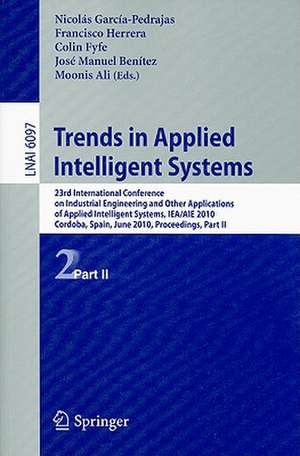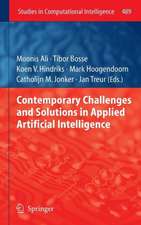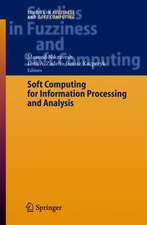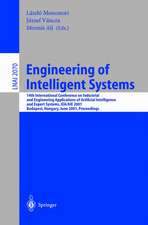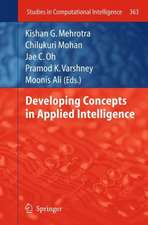Trends in Applied Intelligent Systems: 23rd International Conference on Industrial Engineering and Other Applications of Applied Intelligent Systems, IEA/AIE 2010, Cordoba, Spain, June 1-4, 2010, Proceedings, Part II: Lecture Notes in Computer Science, cartea 6097
Editat de Nicolás García-Pedrajas, Francisco Herrera, Colin Fyfe, José Manuel Benítez Sánchez, Moonis Alien Limba Engleză Paperback – 20 mai 2010
| Toate formatele și edițiile | Preț | Express |
|---|---|---|
| Paperback (3) | 665.75 lei 3-5 săpt. | |
| Springer Berlin, Heidelberg – 20 mai 2010 | 665.75 lei 3-5 săpt. | |
| Springer Berlin, Heidelberg – 20 mai 2010 | 665.75 lei 6-8 săpt. | |
| Springer Berlin, Heidelberg – 20 mai 2010 | 670.70 lei 6-8 săpt. |
Din seria Lecture Notes in Computer Science
- 20%
 Preț: 1061.55 lei
Preț: 1061.55 lei - 20%
 Preț: 307.71 lei
Preț: 307.71 lei - 20%
 Preț: 438.69 lei
Preț: 438.69 lei - 20%
 Preț: 645.28 lei
Preț: 645.28 lei -
 Preț: 410.88 lei
Preț: 410.88 lei - 15%
 Preț: 580.46 lei
Preț: 580.46 lei - 17%
 Preț: 427.22 lei
Preț: 427.22 lei - 20%
 Preț: 596.46 lei
Preț: 596.46 lei -
 Preț: 381.21 lei
Preț: 381.21 lei - 20%
 Preț: 353.50 lei
Preț: 353.50 lei - 20%
 Preț: 1414.79 lei
Preț: 1414.79 lei - 20%
 Preț: 309.90 lei
Preț: 309.90 lei - 20%
 Preț: 583.40 lei
Preț: 583.40 lei - 20%
 Preț: 1075.26 lei
Preț: 1075.26 lei - 20%
 Preț: 310.26 lei
Preț: 310.26 lei - 20%
 Preț: 655.02 lei
Preț: 655.02 lei - 20%
 Preț: 580.93 lei
Preț: 580.93 lei - 20%
 Preț: 340.32 lei
Preț: 340.32 lei - 15%
 Preț: 438.59 lei
Preț: 438.59 lei - 20%
 Preț: 591.51 lei
Preț: 591.51 lei - 20%
 Preț: 649.49 lei
Preț: 649.49 lei - 20%
 Preț: 337.00 lei
Preț: 337.00 lei -
 Preț: 449.57 lei
Preț: 449.57 lei - 20%
 Preț: 607.39 lei
Preț: 607.39 lei - 20%
 Preț: 1024.44 lei
Preț: 1024.44 lei - 20%
 Preț: 579.30 lei
Preț: 579.30 lei - 20%
 Preț: 763.23 lei
Preț: 763.23 lei - 20%
 Preț: 453.32 lei
Preț: 453.32 lei - 20%
 Preț: 575.48 lei
Preț: 575.48 lei - 20%
 Preț: 585.88 lei
Preț: 585.88 lei - 20%
 Preț: 825.93 lei
Preț: 825.93 lei - 20%
 Preț: 763.23 lei
Preț: 763.23 lei - 17%
 Preț: 360.19 lei
Preț: 360.19 lei - 20%
 Preț: 1183.14 lei
Preț: 1183.14 lei - 20%
 Preț: 340.32 lei
Preț: 340.32 lei - 20%
 Preț: 504.57 lei
Preț: 504.57 lei - 20%
 Preț: 369.12 lei
Preț: 369.12 lei - 20%
 Preț: 583.40 lei
Preț: 583.40 lei - 20%
 Preț: 343.62 lei
Preț: 343.62 lei - 20%
 Preț: 350.21 lei
Preț: 350.21 lei - 20%
 Preț: 764.89 lei
Preț: 764.89 lei - 20%
 Preț: 583.40 lei
Preț: 583.40 lei -
 Preț: 389.48 lei
Preț: 389.48 lei - 20%
 Preț: 341.95 lei
Preț: 341.95 lei - 20%
 Preț: 238.01 lei
Preț: 238.01 lei - 20%
 Preț: 538.29 lei
Preț: 538.29 lei
Preț: 665.75 lei
Preț vechi: 832.19 lei
-20% Nou
Puncte Express: 999
Preț estimativ în valută:
127.40€ • 132.26$ • 106.24£
127.40€ • 132.26$ • 106.24£
Carte disponibilă
Livrare economică 01-15 martie
Preluare comenzi: 021 569.72.76
Specificații
ISBN-13: 9783642130243
ISBN-10: 3642130240
Pagini: 699
Ilustrații: XIX, 680 p. 205 illus.
Greutate: 0.98 kg
Ediția:2010
Editura: Springer Berlin, Heidelberg
Colecția Springer
Seriile Lecture Notes in Computer Science, Lecture Notes in Artificial Intelligence
Locul publicării:Berlin, Heidelberg, Germany
ISBN-10: 3642130240
Pagini: 699
Ilustrații: XIX, 680 p. 205 illus.
Greutate: 0.98 kg
Ediția:2010
Editura: Springer Berlin, Heidelberg
Colecția Springer
Seriile Lecture Notes in Computer Science, Lecture Notes in Artificial Intelligence
Locul publicării:Berlin, Heidelberg, Germany
Public țintă
ResearchCuprins
Engineering Knowledge and Semantic Systems.- Improving Effectiveness of Query Expansion Using Information Theoretic Approach.- Defining Coupling Metrics among Classes in an OWL Ontology.- Enterprise 2.0 and Semantic Technologies for Open Innovation Support.- Algorithmic Decision of Syllogisms.- Matching Multilingual Tags Based on Community of Lingual Practice from Multiple Folksonomy: A Preliminary Result.- Ensemble Learning: Methods and Applications.- Multiclass Mineral Recognition Using Similarity Features and Ensembles of Pair-Wise Classifiers.- Ensembles of Probability Estimation Trees for Customer Churn Prediction.- Evolving Ensembles of Feature Subsets towards Optimal Feature Selection for Unsupervised and Semi-supervised Clustering.- Building a New Classifier in an Ensemble Using Streaming Unlabeled Data.- Random Projections for SVM Ensembles.- Rotation Forest on Microarray Domain: PCA versus ICA.- An Empirical Study of Multilayer Perceptron Ensembles for Regression Tasks.- Ensemble Methods and Model Based Diagnosis Using Possible Conflicts and System Decomposition.- Evolutionary Computation and Applications.- Entropy-Based Evaluation Relaxation Strategy for Bayesian Optimization Algorithm.- A New Artificial Immune System for Solving the Maximum Satisfiability Problem.- Power-Aware Multi-objective Evolutionary Optimization for Application Mapping on NoC Platforms.- A Discrete Differential Evolution Algorithm for Solving the Weighted Ring Arc Loading Problem.- A Parallel Genetic Algorithm on a Multi-Processor System-on-Chip.- The Influence of Using Design Patterns on the Process of Implementing Genetic Algorithms.- Fuzzy Systems and Applications.- Obtaining Significant Relations in L-Fuzzy Contexts.- Knowledge Extraction Based on Fuzzy Unsupervised Decision Tree:Application to an Emergency Call Center.- Optimization of Embedded Fuzzy Rule-Based Systems in Wireless Sensor Network Nodes.- An Algorithm for Online Self-organization of Fuzzy Controllers.- A Mechanism of Output Constraint Handling for Analytical Fuzzy Controllers.- Analysis of the Performance of a Semantic Interpretability-Based Tuning and Rule Selection of Fuzzy Rule-Based Systems by Means of a Multi-Objective Evolutionary Algorithm.- Testing for Heteroskedasticity of the Residuals in Fuzzy Rule-Based Models.- Heuristic Methods and Swarm Intelligence for Optimization.- Heuristic Methods Applied to the Optimization School Bus Transportation Routes: A Real Case.- Particle Swarm Optimization in Exploratory Data Analysis.- Using the Bees Algorithm to Assign Terminals to Concentrators.- Multicriteria Assignment Problem (Selection of Access Points).- Composite Laminates Buckling Optimization through Lévy Based Ant Colony Optimization.- Teaching Assignment Problem Solver.- Swarm Control Designs Applied to a Micro-Electro-Mechanical Gyroscope System (MEMS).- Industrial Applications of Data Mining: New Paradigms for New Challenges.- A Representation to Apply Usual Data Mining Techniques to Chemical Reactions.- Incident Mining Using Structural Prototypes.- Viability of an Alarm Predictor for Coffee Rust Disease Using Interval Regression.- Prediction of Web Goodput Using Nonlinear Autoregressive Models.- Domain Driven Data Mining for Unavailability Estimation of Electrical Power Grids.- Intelligent Agent-Based Systems.- Social Order in Hippocratic Multi-Agent Systems.- Building an Electronic Market System.- Information Theory Based Intelligent Agents.- A Possibilistic Approach to Goal Generation in Cognitive Agents.- Modelling Greed of Agents in Economical Context.- Modelingand Verifying Agent-Based Communities of Web Services.- Interactive and Cognitive Environments.- An Ambient Intelligent Agent Model Based on Behavioural Monitoring and Cognitive Analysis.- The Combination of a Causal and Emotional Learning Mechanism for an Improved Cognitive Tutoring Agent.- Driver’s Behavior Assessment by On-board/Off-board Video Context Analysis.- An eHealth System for a Complete Home Assistance.- Tracking System Based on Accelerometry for Users with Restricted Physical Activity.- Internet Applications.- Web Query Reformulation Using Differential Evolution.- On How Ants Put Advertisements on the Web.- Mining Association Rules from Semantic Web Data.- Hierarchical Topic-Based Communities Construction for Authors in a Literature Database.- Generating an Event Arrangement for Understanding News Articles on the Web.- Architecture for Automated Search and Negotiation in Affiliation among Community Websites and Blogs.- Knowledge Management and Knowledge Based Systems.- Effect of Semantic Differences in WordNet-Based Similarity Measures.- An Ontological Representation of Documents and Queries for Information Retrieval Systems.- Predicting the Development of Juvenile Delinquency by Simulation.- Building and Analyzing Corpus to Investigate Appropriateness of Argumentative Discourse Structure for Facilitating Consensus.- Improving Identification Accuracy by Extending Acceptable Utterances in Spoken Dialogue System Using Barge-in Timing.- A New Approach to Construct Optimal Bow Tie Diagrams for Risk Analysis.- Machine Learning.- Feature Selection and Occupancy Classification Using Seismic Sensors.- Extending Metric Multidimensional Scaling with Bregman Divergences.- Independent Component Analysis Using Bregman Divergences.- Novel Method for Feature-SetRanking Applied to Physical Activity Recognition.- Time Space Tradeoffs in GA Based Feature Selection for Workload Characterization.- Learning Improved Feature Rankings through Decremental Input Pruning for Support Vector Based Drug Activity Prediction.- Scaling Up Feature Selection by Means of Democratization.
